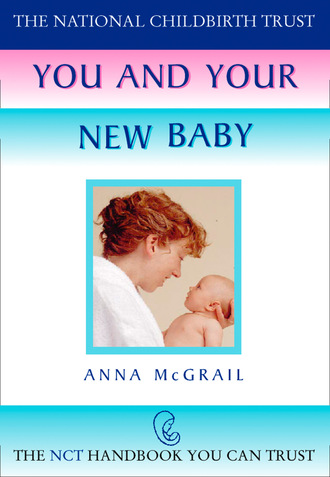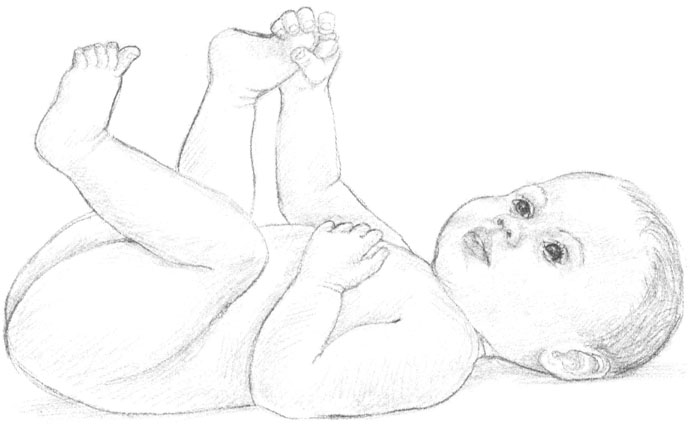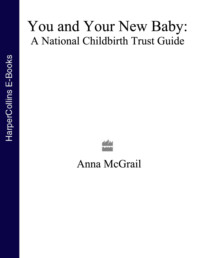
Полная версия
The National Childbirth Trust
Research continues into the causes and the reasons why some women get this rare and distressing illness, and the most effective treatments, but there are no definite answers yet. The work done by Dr Katarina Dalton on the use of progesterone injections as a means of prevention is gaining coverage and acceptance. Although its preventive role cannot help a first-time sufferer, it can be of great reassurance to those who have suffered that they do not need to go through this again.
A ‘ROUTINE’
CHANCES ARE, at least one health professional or relative will have advised you how desirable a routine is for your baby, although very young babies may not respond well to being ‘put into’ a routine. However, it can be helpful to establish an evening routine of supper, bath, story, bed (or similar). This sort of routine, if established early, can reduce bedtime problems in toddlerhood. Indeed, it gives most children a feeling of safety and security if roughly the same things happen at roughly the same time every day. It helps to give a sense of pattern and reassurance. And it can help you, too, if you’re finding the demands of parenthood overwhelming: a routine can bring everything down to more manageable proportions.
Beverley felt she needed to get her new life into some sort of order: ‘I think my idea of a “routine” came from my mum. Also, it came from me in the first three months trying not to have a routine. I remember thinking, “I want Josh to be a really flexible baby. I’m going to take him out with me whenever I need to go, feed him whenever he’s hungry, put him to sleep when he’s tired, and he’s just going to adapt and be really flexible and it’ll be great.” And it was a nightmare. He ended up not having a sleep in the day, and then he wasn’t sleeping well at night… it was just terrible. And I found that once I started doing things in this very strict routine – which I really resented, I didn’t like having to do it at all – things got better. I thought, “Right, ten o’clock, he’ll have a morning nap. Three o’clock, he’ll have an afternoon nap,” and I put him in his cot and he just started having them. It made a difference because I could say to people, “Oh, come round then because I know he’ll be asleep”, or whatever. I know where I stand, now.’
YET, NO MATTER how desirable a ‘routine’ may be, one thing many parents resent is the lack of spontaneity in their lives. Whether you intended to carry on as before or not, you’ll soon find you can’t.
Deirdre’s mental planning will sound familiar to you if you’ve already had your baby: ‘I’d think, right, she’s due for a feed in the next hour or so, and afterwards she’ll probably fill her nappy, so if I change her then, we could go out after that and she’ll probably have a sleep in the pram, but that means I won’t have had my lunch … Okay, if I have my lunch now – it’s about ten o’clock in the morning – that might do it. And if we spend longer there than I planned on, I’ll be in trouble if I don’t have what she needs, so I’ll have to take wipes, nappy cream, dummy, bottle of water … And then I have to organise all these and then she wakes up and I still haven’t had my lunch and this is all just to go round and have a cup of tea with a friend. How women go out to work every morning when they have babies, I just don’t know. This is what I can’t stand, not just being able to pop out and have a cup of tea when I feel like it.’
Olivia’s comments ring true too: ‘There’s a picture in a book of a father typing and this baby sitting in a bouncy chair watching him. It’s got this cheerful caption like “Let the baby join in family life!” I can just see Beatrice sitting in her chair watching while Robert studies engineering. I think images like that can build up a false picture. Especially if your baby’s not conforming to that image.’
WHEN YOUR BABY arrives, images are what you have to forget. In the mother-and-baby magazines, those are models you are looking at, with their shiny hair and their designer outfits in their polished kitchens. They aren’t real mums. Real mums have mysterious stains on their jumpers and a permanently quizzical expression, as if they’ve just forgotten which day of the week it is … which is usually because they have. And real mums have real babies.
Coping with that reality, with all its stresses and strains as well as its joys and delights, is what becoming a family is all about.

Конец ознакомительного фрагмента.
Текст предоставлен ООО «ЛитРес».
Прочитайте эту книгу целиком, купив полную легальную версию на ЛитРес.
Безопасно оплатить книгу можно банковской картой Visa, MasterCard, Maestro, со счета мобильного телефона, с платежного терминала, в салоне МТС или Связной, через PayPal, WebMoney, Яндекс.Деньги, QIWI Кошелек, бонусными картами или другим удобным Вам способом.


